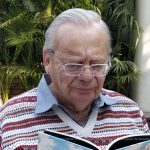Pandit Anand Narain Mulla
(24th October 1901 – 12th June 1997)
One of the finest example of Ganga-Jamuni Tehzeeb of Lucknow in Literature
Sar-e Mehshar Yehi Puchunga Khuda Se Pehle, Toone Roka Bhi Tha Bande Ko Khata Se Pehle
Forgotten in the recently concluded Lok Sabha elections is Pandit Anand Narain Mulla who represented Lucknow in the fourth Lok Sabha as an independent candidate in 1967.
He was also a member of the Rajya Sabha for two terms as a nominee of the Congress Party. One of the finest example of Ganga-Jamuni Tehzeeb, Mulla was a lawyer and social activist but above all he was a poet a multi-talented person, It is people like Mulla who make life in Lucknow so different from other cities. Yet neither the government nor well known organizations, institutions or scholars seem to do anything to make sure that the memory of these precious stars continues to glow!
Woh Kaun Hain Jinhein Tauba Ki Mil Gai Fursat, Humein Gunaah Bhi Karne Ko Zindagi Kam Hai
Personal Life
Mulla was a Kashmiri Pandit born in Lucknow. His father Jagat Narain Mulla was prominent advocate and Vice Chancellor of Lucknow University. Mulla was an alumni of Jubilee High School, Lucknow and later completed his post-graduate studies from Lucknow University.
Between 1946 and 1952, he was chairman of the Indo-Pak Tribunal and a judge of the Allahabad High Court between 1954 and 1961.
In a landmark judgement, Mulla is remembered as saying that there is not a single lawless group in the whole of the country whose record of crime comes anywhere near the record of that single organised unit which is known as the Indian Police Force…the police force in Uttar Pradesh is an organised gang of criminals.
His observation, is still the hot favourite of votaries of civil liberties and human rights. After retirement, he served at the Supreme Court.
“Dard-e Dil Ko Gham-e Ulfat Kahu’n Sauda Kahu’n, Mein Yehi Hairaan Hoo Kis Se Kahu’n Aur Kya Kahu’n”
Literary contribution
“Watan Phir Tujh Ko Paimaan-e Wafa Dene Ka Waqt Aaya, Tere Namus Par Sab Kuch Luta Dene Ka Waqt Aaya”
Mulla is one of the most important poets of the 20th century, famous for his patriotic poetry along with social concerns. He started by writing poetry in English in 1926 when he was still in college. He has translated poetry into English, prominently of the great Urdu poet Allama Iqbal. His ustad or mentor in Urdu poetry was Barkat Ullah Razi Lucknawi but he was very influenced by Brij Narain Chakbast.
Talent from the Progressive Writers Movement also inspired his writings in both ghazals or love lyrics and nazm or poetic narrations.
Former prime minister, Inder Kumar Gujral praised the prose written by Mulla and pointed him out as a pioneer who promoted the Urdu language. He was president of the Anjuman Taraqqi-e Urdu an first chairman, UP Urdu Academy formed on 25 January 1972 till 1977.
He received the Sahitya Akademi Award in 1964 for his book Meri Hadis-e Umr-e Gurezan and has been awarded by several institutions like the Iqbal Samman, UP Academy, Delhi Academy, Bihar Academy and Fakhruddin Ali Ahmed Memorial Committee.
In 1995, Anjuman Taraqqi-e Urdu published the Pandit Anand Narain Mulla ki Adabi Khidmat to commemorate his services to the Urdu language.
Satane Ko Sata Le Aaj Zalim Jitna Jee Chahe, Magar Itna Kahe Dete Hain Mardaan Watan Hum Hain, Sulaegi Humein Khaak-e Watan Aaghosh Mein Apni, Na Fikr-e Gor Hai Hum Ko Na Mohtaaj-e Kafan Hum Hain
In love with Urdu
“Mein apna mazhab chorr sakta hoo, lekin urdu zabaan nahi”, said Mulla that he can turn his back on his religion but not on his language which is Urdu, also refuting claims by some conservatives that this is a language only of Muslims.
The other non-Muslims also in love with Urdu include Raghupati Sahai Firaq Gorakhpuri. Mulla was praised by Firaq for the refined use of language where tum, or just you was not used even when referring to a dog.
On one occasion, the Firaq’s dog slept on a sofa when Mulla came to visit. Immediately Firaq chided his dog saying that a visitor has come and you continue to sleep here. Go inside and lie down:
Mehmaan tashreef laye hain aur aap so rahe hain? Jaiye andar jaakar letiye!
The dog, familiar with the refined way of talking and understanding everything said to him, calmly got up and went inside.
Firaq continued that the use of the word tum provokes his dog to bark and he faints if someone calls him tu!
Can we expect the same refinement of language in the 21st century? Or just allow the pehle aap way of life of Lucknow to shift to pehle mein?
“Jis Ke Khayal Mein Hoo Gum Usko Bhi Kuch Khayal Hai, Mere Liye Yehi Sawaal Sab Se Bada Sawaal Hai”




